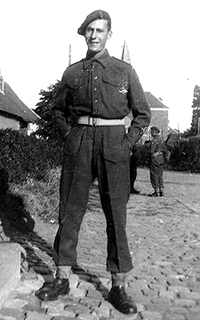Tom Wardle
Thomas (Tom) Wardle was a highly-regarded UK pacifist who was active in the 1950s in the anti-apartheid, non-violence and civil rights movements. He was also a leader in early anti-nuclear protests as a member of Operation Gandhi.
Tom worked with Bayard Rustin, A.J. Muste, ‘Roy’ Finch and Michael Scott to promote non-violent protest against racial inequality, with views developed and honed during his time as an assistant to Manilal Gandhi on the newspaper, Indian Opinion.Tom lived with his Dutch-born wife, Nanny (nee Bijvoet) and baby daughter Shanti, at the Phoenix settlement, managed by Gandhi, for a few months in 1952. He then returned to London and took up a position as a journalist on Peace News.
An enduring commitment to pacifism saw Tom then study in Manchester to become a Unitarian Minister, in which role he and his family, now including a son, Mark, emigrated to Australia in 1960. A late career change to teaching saw the family settle in and around Geelong, Victoria, where Tom remained for the rest of his life.
Tom Wardle (1923-1992)
Born at home in working-class Bootle, Liverpool in 1923, Thomas (Tom) Wardle was the youngest surviving child of Annie-Mary (nee Bond) and Arthur John Jones Wardle. Arthur worked on the docks and died of heart failure when Tom was only two, but the young boy was brought up in a loving home with his brothers, Alf and Arthur and sisters Ruth and Gertie.

Young Tom with his mother Annie-Mary and elder brothers and sisters ~1930
Tom enjoyed his schooling and demonstrated early his quick intellect and love of learning. He completed the 5th form at Waterloo-with-Seaforth Grammar School in 1939. He joined the British army at 18 and served from 1942-1947. He saw service with British Airborne Forces in Europe (France, Belgium, Holland). He was later deployed to the Far East theatre (India, Malaya, Java, Ceylon). Tom developed anti-militarist views as a result of his experiences with the British Army in Java at the time of the Indonesian insurrection. Understandably, his war experience was to have a profound effect on the remainder of his life.
Once demobilised, he met his future wife, Nanny Bijvoet, at a dance in Liverpool. Nanny had endured the occupation of her home country, The Netherlands, throughout the war and had been sent to England for a holiday on the return of her father from his war service. Tom and Nanny married in Liverpool in December 1947.
